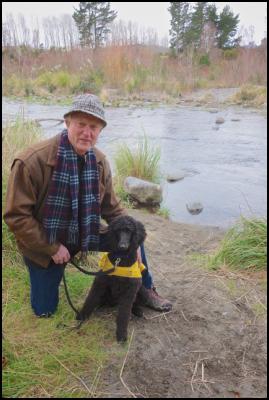Hearing Dogs Trained To Keep An Ear Out For Their Owners
Hearing Dogs Trained To Keep An Ear Out For Their Owners

Tasha, a 3-year-old black standard poodle, knows exactly what to do if she hears a knock at her front door in Turangi.
The specially trained hearing dog will immediately find her owner, Ken Proudfoot, who is profoundly deaf, and gently put her paws up on his lap. She’ll then lead him downstairs to the source of the noise.
Tasha has lived with Ken and his
wife, Mieke, who is also deaf in one ear, for the past 18
months and has made a big difference to their quality of
life.
“At the end of the day you can’t wear hearing
aids all the time,” Ken explains. “I can’t sleep with
them in, or shower with them, and you need to take them out
every now and again so natural air can circulate.
“A hearing dog can alert you to sounds you might not otherwise hear, such as a fire alarm, the telephone, a door bell or even a cooking timer.”
Prior to Tasha, Ken had another hearing dog, Gemma, who used to accompany him to meetings, restaurants and hotels when he had to travel. Ken says both dogs have been reassuring companions, particularly in situations when he is on his own.
Making life
easier
Tasha is one of 57 fully qualified hearing dogs
working in New Zealand at present, with several more
currently in training. Six of those dogs are working in
different locations around the Bay of Plenty.
The
organisation which trains them, Hearing Dogs For Deaf People
NZ, is a charitable trust that has operated nationwide for
the past 16 years.
Funding manager Jacqui Cameron says
hearing impairment or deafness is an ‘invisible’
disability that affects one in 10 New Zealanders.
She says people can often feel isolated, lonely and frustrated. A hearing dog not only helps make their everyday lives easier, but it also gives them greater independence, social interaction, self-confidence and security.
“Even the simplest of tasks, like answering the front door or the telephone, are taken away from you when you have a hearing impairment,” Jacqui says.
“Smoke alarms are a big one. We teach the dogs to lie flat as a pancake on the ground in front of the recipient. They then know it’s an emergency and need to get outside.”
Intensive training
Hearing
dogs are trained at a special facility in New Plymouth. Many
are rescued from the SPCA as pups, or donated by dog
breeders around the country.
“We can’t have dogs that
are nervous or overly aggressive,” Jacqui says. “That
won’t work. So they’re fully socialized and then
assessed before they enter our training programme. We choose
very well behaved dogs who follow instructions
well.”
Each dog costs approximately $30,000 to train. They are then assessed after one year of placement before they’re deemed to be fully qualified, and Hearing Dogs continues to monitor their progress every year to make sure they’re working effectively.
“These dogs can go anywhere. They go to the supermarket, libraries, to workplaces, to university. They can even fly on airplanes,” Jacqui says.
Crucial support
BayTrust
donated $5000 to Hearing Dogs this year to help with local
operational costs – money which Jacqui says has been put
to excellent use. “We have had one new dog placed recently
in the Bay of Plenty, and that money has gone towards their
costs, as well as to help fund our support programme and
annual assessments in the region.”
The support programme
comprises a team of dog trainers who are available by phone
24/7 to help recipients if they have any problems or
concerns.
Dog trainers also spend at least one week with
each recipient when the dog first arrives in their home to
help settle them in and familiarise themselves with their
new neighbourhood.
“It makes a big difference to their lives but it’s actually a massive thing to take a hearing dog into their home. We try to give both them, and the dog, as much support as possible.”
Jacqui aims to help fundraise $260,000 every year to keep Hearing Dogs up and running. “We like to try and train around 10 dogs a year. But we’d love to increase that if we could.”
ends


 Health Coalition Aotearoa: New Bill A Vital Step Towards Tobacco-Free Future In Aotearoa
Health Coalition Aotearoa: New Bill A Vital Step Towards Tobacco-Free Future In Aotearoa National Youth Theatre: 140 Christchurch Kids Shine In National Youth Theatre’s Historic CATS Premiere
National Youth Theatre: 140 Christchurch Kids Shine In National Youth Theatre’s Historic CATS Premiere NZ Symphony Orchestra: NZSO To Tour Masterworks By Mozart, Beethoven, Haydn And More
NZ Symphony Orchestra: NZSO To Tour Masterworks By Mozart, Beethoven, Haydn And More Journal Of Public Health: Vape Shops Cluster Around Schools
Journal Of Public Health: Vape Shops Cluster Around Schools Timaru District Council: Aigantighe Art Gallery Hosts An Iconic Robin White Touring Exhibition
Timaru District Council: Aigantighe Art Gallery Hosts An Iconic Robin White Touring Exhibition Victoria University of Wellington: Dame Winnie Laban Awarded Honorary Doctorate Recognising Achievements For Pasifika
Victoria University of Wellington: Dame Winnie Laban Awarded Honorary Doctorate Recognising Achievements For Pasifika 